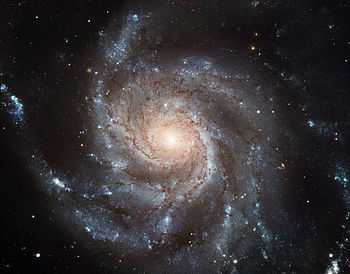M101 Group
| M101 Group | |
|---|---|
|
The Pinwheel Galaxy, the brightest galaxy in the M101 Group | |
| Observation data (Epoch J2000) | |
| Constellation(s) | Ursa Major |
| Right ascension | 14h 04m[1][2] |
| Declination | +54° 31′[1][2] |
| Brightest member | Pinwheel Galaxy[1][2][3] |
| Number of galaxies | 6-9[1][2][4][3] |
| Other designations | |
|
NGC 5457 Group, LGG 371,[1] NOGG H 758,[2] NOGG P1 766,[2] NOGG P2 781[2] | |
| See also: Galaxy groups, Galaxy clusters, List of galaxy clusters | |
The M101 Group is a loose group of galaxies located in Ursa Major. The group is named after the brightest galaxy in the group, the Pinwheel Galaxy (M101). Most of the other members of the group are companions of the Pinwheel Galaxy.[1][2][4][3] The group itself is one of many located within the Virgo Supercluster (i.e. the Local Supercluster).[5]
Members
The table below lists galaxies that have been consistently identified as group members in the Nearby Galaxies Catalog,[4] the survey of Fouque et al.,[3] the Lyons Groups of Galaxies (LGG) Catalog,[1] and the three group lists created from the Nearby Optical Galaxy sample of Giuricin et al.[2]
| Name | Type[6] | R.A. (J2000)[6] | Dec. (J2000)[6] | Redshift (km/s)[6] | Apparent Magnitude[6] |
|---|---|---|---|---|---|
| Pinwheel Galaxy (M101) | SAB(rs)cd | 14h 03m 12.6s | +54° 20′ 57″ | 241 ± 2 | 8.3 |
| NGC 5204 | SA(s)m | 13h 29m 36.5s | +58° 25′ 07″ | 201 ± 1 | 11.7 |
| NGC 5474 | SA(s)cd pec | 14h 05m 01.6s | +53° 39′ 44″ | 273 ± 9 | 11.3 |
| NGC 5477 | SA(s)m | 14h 05m 33.2s | +54° 27′ 39″ | 304 ± 5 | 14.4 |
| NGC 5585 | SAB(s)d | 14h 19m 48.2s | +56° 43′ 45″ | 293 ± 2 | 11.2 |
| UGC 8837 | IB(s)m | 13h 54m 45.8s | +53° 54′ 03″ | 144 ± 3 | 13.8 |
| UGC 9405 | Im | 14h 35m 24.4s | +57° 15′ 19″ | 222 ± 6 | 17 |
Other possible members galaxies (galaxies listed in only one or two of the lists from the above references) include the irregular galaxies NGC 5238 and UGC 8508.
Nearby groups
The M51 Group, which includes the Whirlpool Galaxy (M51) and the Sunflower Galaxy (M63),[1][2][4][3] is located to the southeast of the M101 Group, and the NGC 5866 Group is located to the northwest.[7] The distances to these three groups (as determined from the distances to the individual member galaxies) are similar, which suggests that the M51 Group, the M101 Group, and the NGC 5866 Group are actually part of a single large, loose, elongated group.[7] However, most group identification methods (including those used by the references cited above) identify these three groups as separate entities.
See also
References
- ↑ 1.0 1.1 1.2 1.3 1.4 1.5 1.6 1.7 A. Garcia (1993). "General study of group membership. II - Determination of nearby groups". Astronomy and Astrophysics Supplement 100: 47–90. Bibcode:1993A&AS..100...47G.
- ↑ 2.0 2.1 2.2 2.3 2.4 2.5 2.6 2.7 2.8 2.9 G. Giuricin, C. Marinoni, L. Ceriani, A. Pisani (2000). "Nearby Optical Galaxies: Selection of the Sample and Identification of Groups". Astrophysical Journal 543 (1): 178–194. arXiv:astro-ph/0001140. Bibcode:2000ApJ...543..178G. doi:10.1086/317070.
- ↑ 3.0 3.1 3.2 3.3 3.4 P. Fouque, E. Gourgoulhon, P. Chamaraux, G. Paturel (1992). "Groups of galaxies within 80 Mpc. II - The catalogue of groups and group members". Astronomy and Astrophysics Supplement 93: 211–233. Bibcode:1992A&AS...93..211F.
- ↑ 4.0 4.1 4.2 4.3 R. B. Tully (1988). Nearby Galaxies Catalog. Cambridge: Cambridge University Press. ISBN 0-521-35299-1.
- ↑ R. B. Tully (1982). "The Local Supercluster". Astrophysical Journal 257: 389–422. Bibcode:1982ApJ...257..389T. doi:10.1086/159999.
- ↑ 6.0 6.1 6.2 6.3 6.4 "NASA/IPAC Extragalactic Database". Results for various galaxies. Retrieved 2006-10-15.
- ↑ 7.0 7.1 L. Ferrarese, H. C. Ford, J. Huchra, R. C. Kennicutt Jr., J. R. Mould, S. Sakai, W. L. Freedman, P. B. Stetson, B. F. Madore, B. K. Gibson, J. A. Graham, S. M. Hughes, G. D. Illingworth, D. D. Kelson, L. Macri, K. Sebo, N. A. Silbermann (2000). "A Database of Cepheid Distance Moduli and Tip of the Red Giant Branch, Globular Cluster Luminosity Function, Planetary Nebula Luminosity Function, and Surface Brightness Fluctuation Data Useful for Distance Determinations". Astrophysical Journal Supplement 128 (2): 431–459. arXiv:astro-ph/9910501. Bibcode:2000ApJS..128..431F. doi:10.1086/313391.
